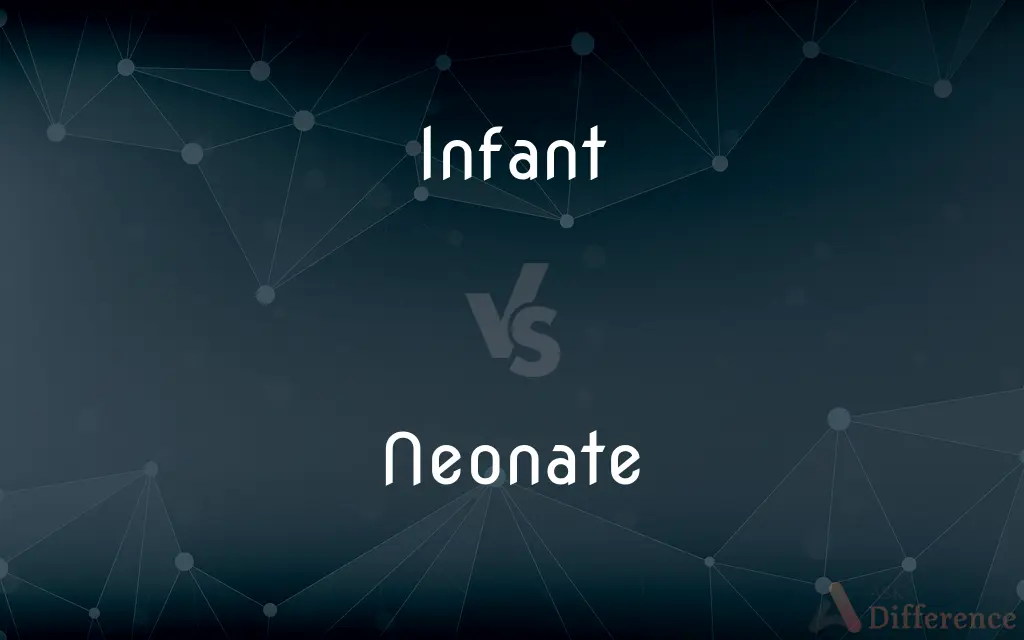Infant vs. Neonate — What's the Difference?
By Maham Liaqat & Fiza Rafique — Updated on March 5, 2024
Infants are children in the first year of life, while neonates are newborns, especially in their first 28 days.

Difference Between Infant and Neonate
Table of Contents
ADVERTISEMENT
Key Differences
Infants encompass a broader age range, covering the first 12 months of a child's life. This period is marked by rapid physical and cognitive development, including milestones such as sitting, crawling, and possibly beginning to walk. Infants gradually transition from a liquid diet to solid foods and develop stronger social bonds. Neonates, on the other hand, refer specifically to the newborn period, which is the first 28 days of life. This phase is crucial for the newborn's adaptation to the external environment, including stabilizing breathing, heart rate, and temperature. Neonatal care focuses on monitoring the baby's health, ensuring proper feeding, and detecting any early signs of complications.
While all neonates are infants, not all infants are neonates. The term "neonate" highlights the immediate post-birth period, emphasizing the unique care and health considerations of newborns. In contrast, "infant" covers a broader developmental spectrum, addressing growth and milestones over the first year.
The care and medical attention for neonates are often more intensive than for older infants, reflecting the vulnerability of the first month. Neonatal specialists focus on conditions prevalent in the earliest stage of life, while pediatric care for infants addresses broader developmental and health issues.
Both terms underscore the importance of age-specific care and developmental understanding. By distinguishing between neonates and infants, caregivers and medical professionals can better tailor their approaches to the unique needs of children at different stages of early life.
Comparison Chart
Age Range
Birth to 12 months.
Birth to 28 days.
ADVERTISEMENT
Developmental Focus
Overall growth, motor skills, and cognitive development.
Adaptation to external environment, initial growth.
Care Needs
Broad, including nutrition, sleep, and developmental milestones.
Intensive monitoring, feeding, and health assessments.
Medical Specialization
Pediatric care addressing a range of developmental concerns.
Neonatal care focusing on the immediate post-birth period.
Dietary Transition
Transition from milk to solid foods.
Exclusive breastfeeding or formula feeding.
Compare with Definitions
Infant
Experiences significant physical growth.
The infant doubled his birth weight by six months.
Neonate
A newborn baby, especially in the first 28 days.
The neonate underwent a thorough health checkup before leaving the hospital.
Infant
Undergoes various health screenings.
The infant received vaccinations as part of routine health care.
Neonate
Focus on adaptation to external life.
The neonate's feeding and sleeping patterns are closely monitored.
Infant
A child in the first year of life.
The infant began to crawl at eight months.
Neonate
Undergoes newborn screening tests.
The neonate was tested for metabolic and genetic conditions as part of the newborn screening.
Infant
Develops social and emotional bonds.
The infant shows recognition and smiles at her parents.
Neonate
Requires specific neonatal care.
The neonate was placed in an incubator to maintain body temperature.
Infant
Focuses on developmental milestones.
She tracks her infant's growth and milestones through a mobile app.
Neonate
Vulnerable to specific health conditions.
Special attention was given to prevent jaundice in the neonate.
Infant
An infant (from the Latin word infans, meaning 'unable to speak' or 'speechless') is the more formal or specialised synonym for the common term baby, meaning the very young offspring of human beings. The term may also be used to refer to juveniles of other organisms.
Neonate
A baby from birth to four weeks
Infant
A child in the earliest period of life, especially before being able to walk.
Neonate
A newborn infant, especially one less than four weeks old.
Infant
Intended for infants or young children.
Neonate
A newborn infant; recently born baby.
Infant
Of or pertaining to infancy, or the first period of life; tender; not mature; as, infant strength.
Neonate
A newborn child, especially one less than one month old.
Infant
A very young child (birth to 1 year) who has not yet begun to walk or talk;
Isn't she too young to have a baby?
Common Curiosities
What defines an infant?
An infant is defined as a child in the first 12 months of life, experiencing rapid growth and development.
Why is the neonatal period so critical?
The neonatal period is critical for a newborn's health and development, requiring careful monitoring to ensure the baby adapts properly to the external environment.
Can the terms infant and neonate be used interchangeably?
While related, they cannot be used interchangeably due to the specific age and developmental focus of each term; neonate refers to the first 28 days, whereas infant covers the first year.
What are the key developmental milestones for an infant?
Key milestones include smiling, rolling over, sitting, crawling, and possibly beginning to walk, as well as babbling and developing social bonds.
What immediate care do neonates need?
Immediate care includes temperature regulation, initial feeding and nutrition, health screenings, and monitoring for any signs of complications.
What is exclusive breastfeeding, and why is it important for neonates?
Exclusive breastfeeding means feeding the baby only breast milk for the first six months, providing essential nutrients and antibodies.
What is a neonate?
A neonate is a newborn baby, particularly in the first 28 days after birth, requiring specific care and monitoring.
How is pediatric care tailored for infants?
Pediatric care for infants includes routine health screenings, vaccinations, nutritional guidance, and monitoring of physical and cognitive development.
How are growth and development monitored in infants and neonates?
Growth is monitored through regular health check-ups, measuring weight, length, and head circumference, while development is assessed through milestones and screenings.
How do the care needs of an infant and a neonate differ?
Neonates require intensive care focused on adapting to life outside the womb, while infants need broader support for growth and development.
What challenges do neonates face?
Neonates face challenges such as adjusting to breathing air, maintaining body temperature, and proper feeding.
What is the significance of newborn screening tests?
Newborn screening tests are crucial for detecting genetic, metabolic, hormonal, and functional conditions early, allowing for timely treatment and intervention.
How do health professionals support neonates with special needs?
Neonates with special needs receive tailored care, including specialized medical interventions, monitoring, and support for their families.
What role do parents play in the development of an infant?
Parents play a crucial role in providing care, stimulation, and emotional support, facilitating the infant's growth and development.
What vaccinations do infants typically receive?
Infants typically receive vaccinations against diseases like hepatitis B, rotavirus, diphtheria, tetanus, whooping cough, and influenza, among others.
Share Your Discovery

Previous Comparison
Taught vs. Thought
Next Comparison
Hero vs. ZeroAuthor Spotlight
Written by
Maham LiaqatCo-written by
Fiza RafiqueFiza Rafique is a skilled content writer at AskDifference.com, where she meticulously refines and enhances written pieces. Drawing from her vast editorial expertise, Fiza ensures clarity, accuracy, and precision in every article. Passionate about language, she continually seeks to elevate the quality of content for readers worldwide.















































